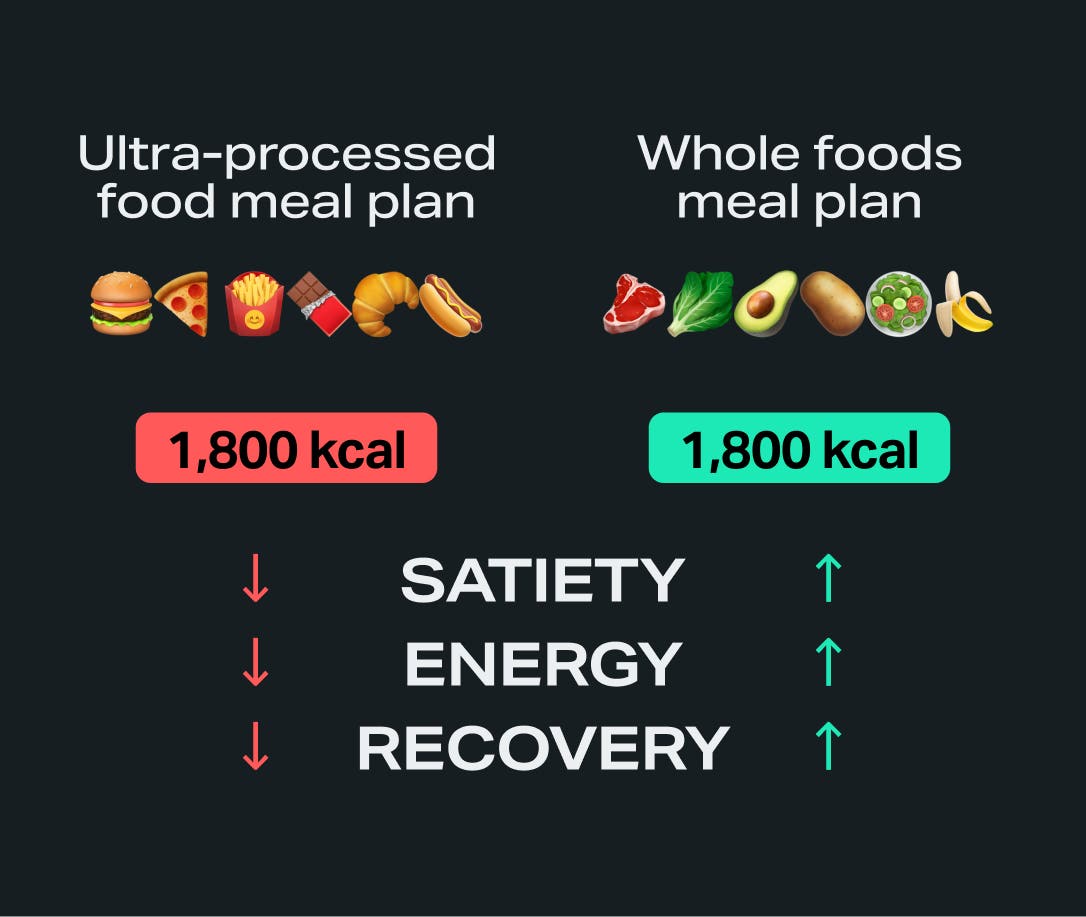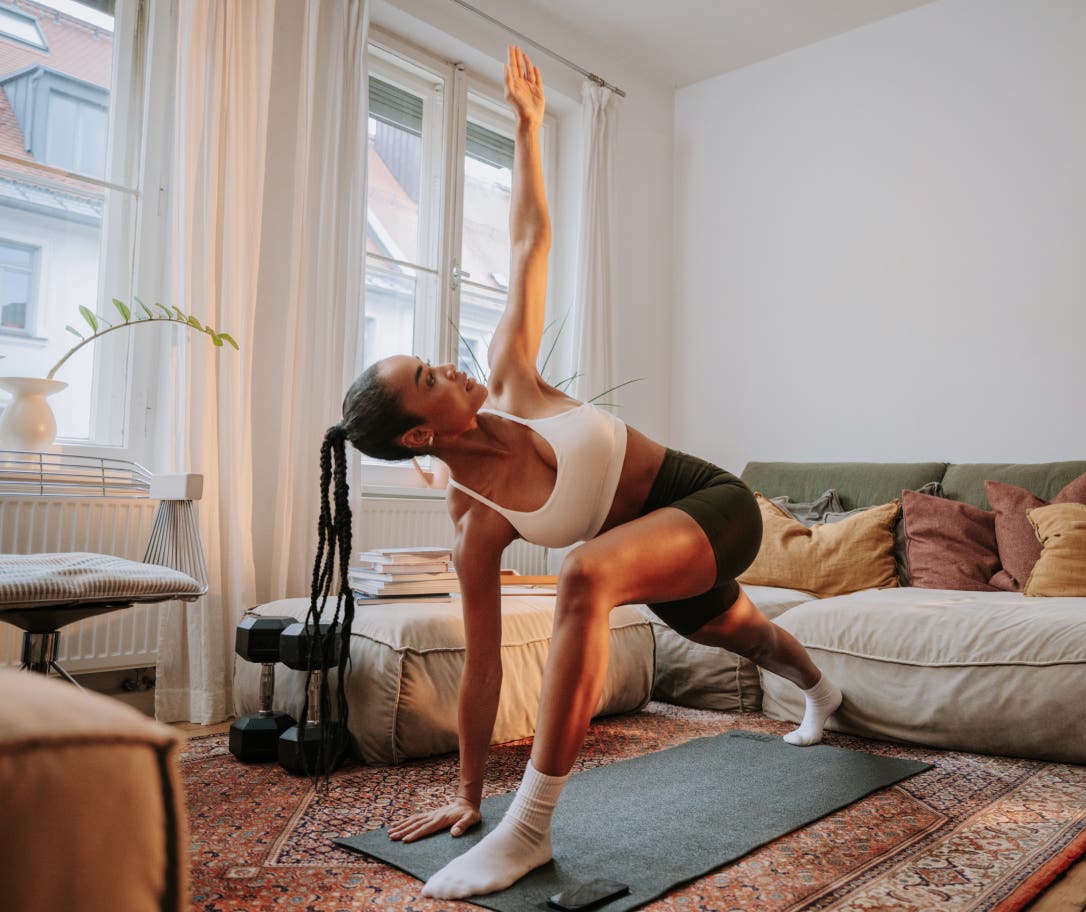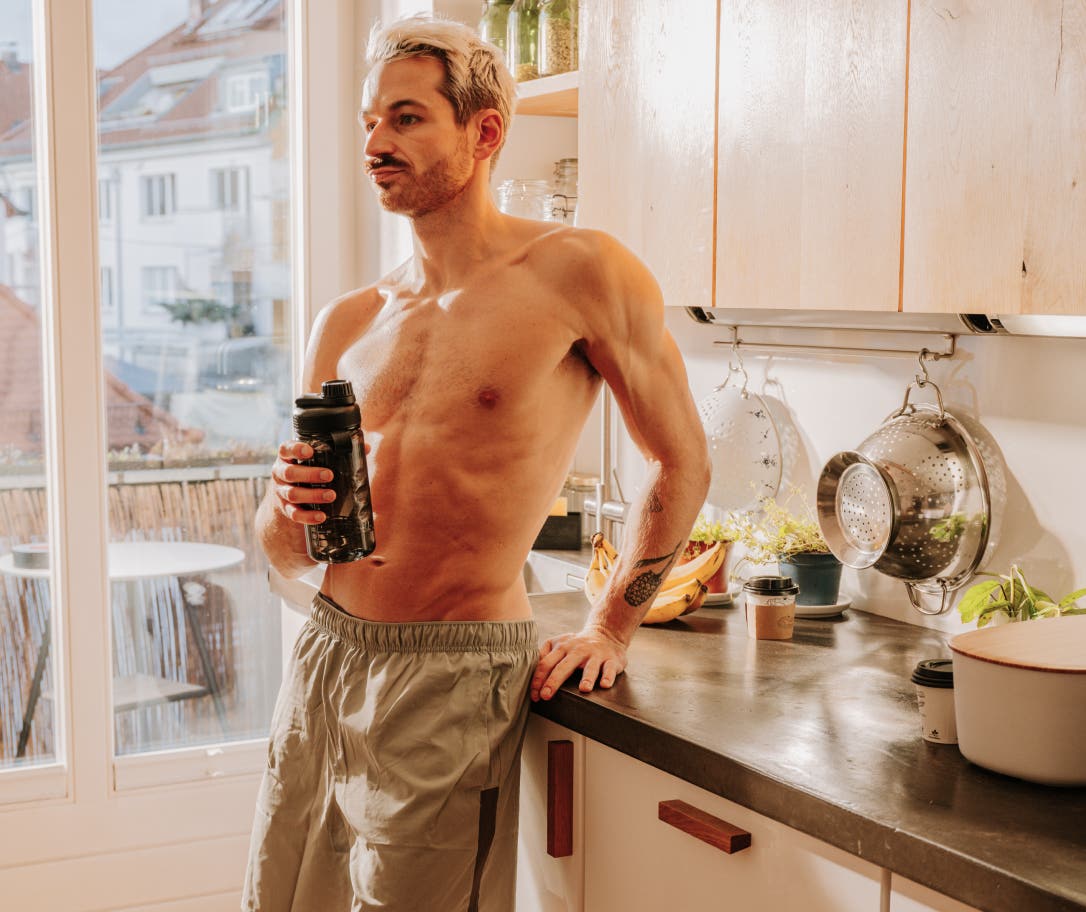Whether your goal is to lose, maintain, or gain body weight, it all comes down to energy balance. Energy balance (calories in vs out) is necessary for weight change, but food composition, satiety, micronutrients, and behavior also impact how sustainable and healthy that change is.
Using exercise to “punish” overeating or food as a “reward” for working out can actually sabotage both your progress and your relationship with food.
No matter how hard you train, you can’t out-exercise a poor diet. While exercise is vital for strength, health, and longevity, it can’t undo the effects of inadequate nutrition and nutritious foods missing from your diet. Let’s explore why.
Diet vs. exercise: what matters more for results?
While calories matter for reaching your fitness goals, the quality of your food and food groups are just as important. What you eat, specifically the vitamins and minerals in your diet, greatly influences both how you feel and how your body functions.
What do we mean by the quality of food?
Taking weight loss as an example, if you stick to a calorie deficit while eating highly processed, calorie-rich foods like junk food high in saturated fats, you may lose some weight, but at a cost. Your energy levels will plummet, your workouts may suffer, and your recovery will stall.
Why? These foods are nutrient-poor and offer little support for your overall health and well-being.
In contrast, eating a diet that prioritizes nutrient-rich whole foods, like wholegrains, brown rice, fresh fruits, vegetables, lean meats and proteins, while also maintaining the same calorie deficit, will not only help you shed the pounds, but you’ll feel stronger, more focused,2 and better able to sustain your progress, thanks to optimal recovery processes.
When including animal proteins, choose lean cuts and limit red meats and processed meat, which are linked with a higher risk of heart disease, certain cancers and other health problems.

The role of nutrition
Nutrition isn’t just about managing calories; it’s the foundation for health, performance, and recovery. Nutrition provides the energy you need to train and compete, fuels muscle growth and repair, optimizes recovery, and supports your general health and injury prevention.
A well-balanced diet ensures you have the necessary fuel your body needs, including carbohydrates, proteins, healthy fats like olive oil and unsaturated fats, and micronutrients to perform at your best and maintain your health.
Alongside calories, here’s four things you should be focusing on:
- Protein and healthy fats: These build and repair every cell in the body. They produce enzymes, hormones, and neurotransmitters, which are essential for various processes, ranging from muscle growth to mood regulation.
- Carbohydrates: Your body’s preferred energy source for high-intensity exercise. Carbohydrates power your workouts and restore muscle glycogen, keeping your training intensity high and fatigue low.
- Fiber: Fiber supports your gut microbiome, improves digestion and mood, and regulates inflammation.
- Micronutrients: Vitamins and minerals support your immune system, facilitate muscle contraction, energy production, and brain function.
A healthy, balanced diet not only supports your performance but also reduces the risk of diet-related chronic diseases, such as diabetes, cardiovascular disease, and certain cancers – whereas diets high in ultra-processed foods and low in nutrients can increase the risk of these conditions.
Plus, when your brain is getting all the nutrients it needs, it may be protected from oxidative stress,3 depression and anxiety,4 and you’ll feel more motivated5 to exercise and less likely to experience unwanted weight gain or body fat accumulation.

The role of exercise
The role of exercise in achieving your fitness goals is huge, and like diet, should never be underestimated. Whether you’re looking to lose weight, build muscle, or improve your overall fitness, regular physical activity influences every aspect of your wellbeing – physical, mental, emotional, and even social. Together, these effects translate into wide-ranging health benefits. Here are some of the main ones.
Cardiovascular health
Exercise strengthens your heart and blood vessels and is associated with a reduced risk of cardiovascular mortality.6 Regular aerobic activity, such as running, cycling, or swimming, improves circulation, helping your heart pump blood more efficiently throughout the body.
Over time, this lowers your resting heart rate and blood pressure, increases oxygen delivery to your muscles, and reduces the risk of heart disease. Even small amounts of regular training sessions can benefit your cardiovascular fitness and endurance.
Muscle mass and strength
Resistance or strength training helps build lean muscle, which not only improves your physique, but also boosts your metabolism. Some research suggests that 10 weeks of resistance training can increase resting metabolic rate by up to 7% and reduce fat mass by 1.8kg.7
Strength training also protects your joints, reduces the risk of injury, and improves your posture and balance,8 benefits that become increasingly important for older adults as we age.

Mobility and bone density
By keeping your body moving and participating in activities that promote coordination and flexibility, such as yoga, Pilates, and bodyweight training, you’ll enhance agility and prevent stiffness. Weight-bearing activities stimulate bone growth and density, helping to prevent conditions like osteoporosis.
NEAT (Non-Exercise Activity Thermogenesis)
NEAT is the amount of energy you burn carrying out everyday activities, like walking, cleaning, and gardening.9 These small movements may seem insignificant, but they can add up to a significant portion of your total daily energy expenditure.
Increasing NEAT is one of the easiest ways to boost metabolism and counteract sedentary habits. Taking the stairs, walking during phone calls, or using a standing desk can all make a meaningful difference to your overall activity level.
Mental Health
Beyond physical health, exercise provides powerful support for your mental well-being. Exercise releases endorphins, or feel-good chemicals, while simultaneously lowering stress hormones like cortisol. Together, this helps to reduce anxiety, improve focus, and even ease symptoms of depression.
Sleep
Quality sleep is crucial for recovery and overall health, and regular exercise is a proven way to improve sleep quality.10 Physical activity promotes deeper, more restorative sleep by regulating your circadian rhythm and lowering stress.
However, be aware that high-intensity interval training (HIIT) workouts before bed can temporarily raise adrenaline levels and make it harder for some people to fall asleep.

How diet and exercise work together
Diet and exercise work hand in hand to support long-term health.
A balanced diet fuels your training, provides the energy to perform at your best, has the nutrients for quick and effective recovery, and supplies the building blocks to stay strong and injury-free.
Exercise helps your body to use the food you eat more efficiently, improving insulin sensitivity, muscle glucose uptake, and overall metabolic health.
This relationship creates a powerful feedback loop where eating well leads to better workouts, faster recovery, and improved body composition, which in turn builds on your motivation and consistency.
Together, proper nutrition and smart training are the foundation blocks of sustainable progress and long-term health.
Let’s recap
While you can’t out-exercise a bad diet, you can create a lifestyle where healthy eating habits fuel performance and exercise enhances your health. Instead of viewing them as separate, try seeing exercise and nutrition as teammates, where food provides the energy, macro- and micronutrients your body needs to perform and repair, and exercise allows your body to use the fuel efficiently.
Sources
[1] Institute of Medicine (US) Committee on Diet and Health; Woteki CE, Thomas PR, editors. Eat for Life: The Food and Nutrition Board's Guide to Reducing Your Risk of Chronic Disease. Washington (DC): National Academies Press (US); 1992. Chapter 5, Calories, Energy Balance, And Chronic Diseases.
[2] Gómez-Pinilla F. (2008). Brain foods: the effects of nutrients on brain function. Nature reviews. Neuroscience, 9(7), 568–578.
[3] Selhub, E (2022). Nutritional psychiatry: Your brain on food.
[4] Menichetti, F., Battezzati, A., Bertoli, S., De Amicis, R., Foppiani, A., Sileo, F., & Leone, A. (2025). Adherence to the Mediterranean diet and risk of anxiety and depression in people with obesity: a cross-sectional analysis. European journal of clinical nutrition, 79(3), 230–236.
[5] Zalachoras, I., Ramos-Fernández, E., Hollis, F., Trovo, L., Rodrigues, J., Strasser, A., Zanoletti, O., Steiner, P., Preitner, N., Xin, L., Astori, S., & Sandi, C. (2022). Glutathione in the nucleus accumbens regulates motivation to exert reward-incentivized effort. eLife, 11, e77791.
[6] Nystoriak, M. A., & Bhatnagar, A. (2018). Cardiovascular Effects and Benefits of Exercise. Frontiers in cardiovascular medicine, 5, 135.
[7] Westcott W. L. (2012). Resistance training is medicine: effects of strength training on health. Current sports medicine reports, 11(4), 209–216.
[8] Behm, D., & Colado, J. C. (2012). The effectiveness of resistance training using unstable surfaces and devices for rehabilitation. International journal of sports physical therapy, 7(2), 226–241.
[9] von Loeffelholz C, Birkenfeld AL. Non-Exercise Activity Thermogenesis in Human Energy Homeostasis. [Updated 2022 Nov 25]. In: Feingold KR, Ahmed SF, Anawalt B, et al., editors. Endotext [Internet]. South Dartmouth (MA): MDText.com, Inc.; 2000-.
[10] Alnawwar, M. A., Alraddadi, M. I., Algethmi, R. A., Salem, G. A., Salem, M. A., & Alharbi, A. A. (2023). The Effect of Physical Activity on Sleep Quality and Sleep Disorder: A Systematic Review. Cureus, 15(8), e43595.